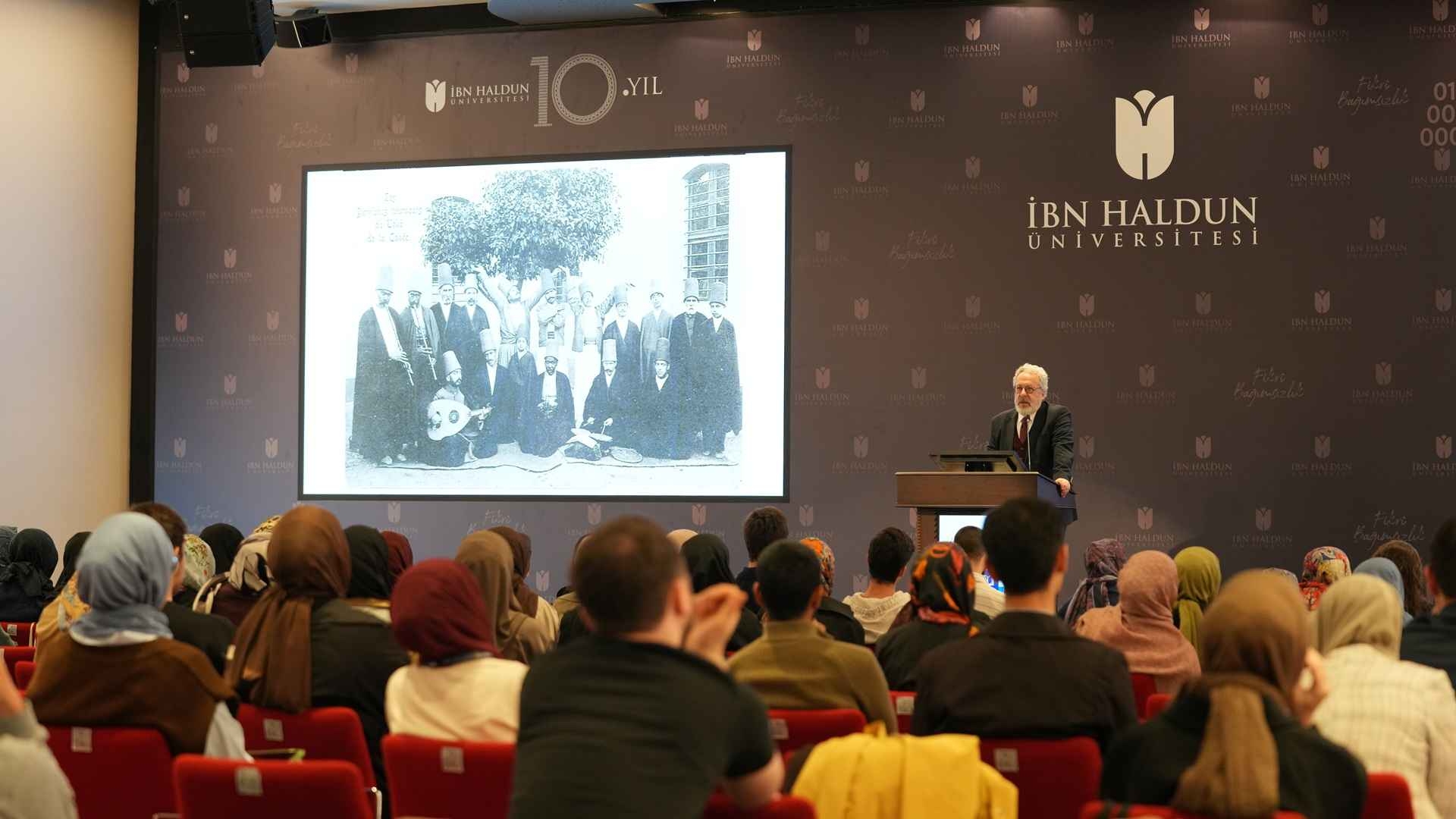


The fifth-week sessions of Ibn Haldun Academy ’25: “Developing Culture and Climate” were held on Saturday, May 17. In the seminars and conferences conducted with contributions from experts across various disciplines, this week’s topics included: virtues within the human soul and the longing for lost spiritual climates, the intellectual contributions of Istanbul’s dervish lodges, contemporary technological and political transformations, and the principles of academic publishing. In sessions attended both in person and online, Assist. Prof. Taha Burak Toprak, Prof. Mahmud Erol Kılıç, M. Enes Dönmez, and Asisst. Prof. Abdullah Demir offered diverse perspectives on historical and contemporary issues within the frameworks of psychology, Sufism, cultural heritage, and academic publishing.
The day began with a seminar titled “Our Lost Climate and the Longing for States” delivered by Clinical Psychologist Dr. Taha Burak Toprak, Head of the Psychology Department at our university. Shaped around themes of psychotherapy, Sufism, contemplation, and the inner voids of the modern world, the seminar progressed interactively with the question, “What does this title evoke for you?” Dr. Toprak centered his talk on the fundamental human need for a sense of security, questioning how psychotherapy defines the individual and in what ways this definition falls short. Emphasizing that in Sufi thought, the meaning sought by humans must first be constructed within, he argued that the ready-made concepts and promises of happiness offered by modern psychotherapy should be re-evaluated in light of ancient values. The session, which revolved around the question of which concepts can lead us to longed-for states such as humility, tranquility, contentment, responsibility, wonder, patience, loyalty, and piety, unfolded on a reflective ground that invited participants to personal introspection. The second part of the seminar will be held next week.
In the second session, Prof. Mahmud Erol Kılıç, Director General of the Research Centre for Islamic History, Art and Culture (IRCICA), delivered a conference titled “Dervish Lodges of Istanbul and Their Contributions to Intellectual Life.” He offered a comprehensive evaluation of the historical, cultural, and intellectual functions of dervish lodges in Istanbul. Emphasizing that these lodges were not merely religious spaces but also centers of education, art, and intellectual production, Prof. Kılıç illustrated how these institutions functioned as foundational pillars of Islamic civilization. He noted that in the Early Ottoman Period, mosques, madrasas, and lodges coexisted, embodying a holistic approach to education and worship, but over time, these structures became physically and intellectually separated. He stated that the closure of lodges and zawiyas in 1925 led to a weakening of the intellectual and spiritual climate, and emphasized our intellectual and moral responsibility to revive this heritage. The conference concluded with a reminder of the Sufi progression of Sharia–Tariqah–Marifah–Haqiqah, underscoring the importance of not forgetting the ultimate aim of Islam.
Another notable session of the day was the conference by M. Enes Dönmez titled “Caught in the Grip of the Technocratic Age: Achieving Freedom Through Authenticity”. Dönmez offered a broad analysis ranging from the transformation of capitalism to technocratic governance, from global financial structures to the impact of digitalization on the individual. He examined the ideological and structural transformation of the modern world through institutions such as the World Economic Forum, the Club of Rome, the Fabian Society, and Technocracy Inc. Highlighting how global economic systems, media monopolies, and algorithms confine individuals to digital echo chambers, Dönmez described this as a “crisis of truth.” He argued that this era presents not only an economic but also an epistemological challenge. As a solution, he emphasized the need to rebuild a tradition of knowledge that engages with society, supported by structures that act with collective consciousness and foster indigenous thought production.
In the final session of the day, Assist. Prof. Abdullah Demir, faculty member at Ankara Yıldırım Beyazıt University Faculty of Theology, delivered a conference titled “The Social Contribution Mission of Universities and Academic Publishing.” He emphasized that universities are not only institutions of education and research but also structures that contribute to society. Within the scope of universities’ third mission—social contribution—he highlighted the importance of activities such as disseminating knowledge, supporting education, addressing environmental issues, and preserving cultural heritage. He provided participants with comprehensive information on various technical aspects, from establishing peer-reviewed journals and setting publication policies to citation systems (especially ISNAD), ethical principles, editorial structures, formatting, indexing criteria, and creating bilingual (Turkish-English) web interfaces. The session offered a roadmap that contributes to academic production processes and provided a deep perspective on the publishing ecosystem.
This week’s sessions of the Academy not only provided knowledge but also broadened participants’ horizons for critical thinking. Ibn Haldun Academy ’25: Developing Culture and Climate will conclude on Saturday, May 24, 2025, with a Closing Lecture by Prof. İbrahim Kalın at 17:00. Following the lecture, a Closing Program and Award Ceremony will be held at 18:00, marking the culmination of this intensive and fruitful intellectual journey.